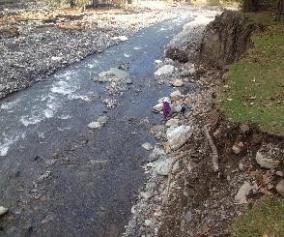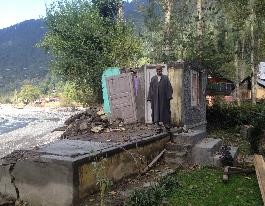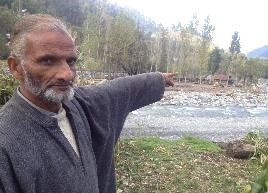MISCELLANEOUS

Trikanjal in Uri block of Baramulla district, is a village located adjacent to a stream flowing down the hills. The settlement is almost a century old now and the community’s livelihood mainly used to depend on natural resources, mostly agriculture. The farmers used to cultivate paddy, apple, green apple and dry nuts in their fields. The population here was originally nomadic, locally known as a ‘Tribal population’ which chose to settle down and take up agriculture. They lived a content life, worked hard in the fields, and invested all their family members’ manpower in agricultural pursuits. On 16th October, 2014 we visited this village to distribute dry ration to the 36 families living here. A small stream flowed very calmly and the water looked crystal clear. One felt that it could easily be crossed simply by walking through it, but the water in it was extremely cold. While distributing the relief kits, we were surprised to see how comfortably the locals crossed the stream with the dry ration weighing around 36kg loaded on their heads or shoulders. My curiosity could not be contained. I wanted to see how far away the village was so I followed the beneficiaries, taking a track which was more than 400 meters long. Even experienced mountaineers would not dare to cross such a difficult path with that weight on their backs. I walked down a kilometre or so, and saw a few damaged houses literally hanging off the edges of the mountains. I could see more people standing in the settlement with kits that had been distributed by CARE. They eagerly invited me to their houses and I was very anxious to hear their stories.

Mr. Ashiqu Ahmed, a gentleman in his mid-50s, said that he could not even begin to comprehend what had happened to him. The rains poured down continuously for four days, and the level of the stream rose to almost 300 times the present level. He had taken his two daughters and his milch animals with him to the top of the mountain. Once the waters receded to normal levels he came down to find his house completely damaged. His misfortune did not stop there. He further saw that whatever agriculture land he owned had been swallowed by the stream. Big stones and dark mud had eroded the soil. The village had stored 3 months’ food ration to tide over the winters, but that too had been swallowed by the river. His apple trees and the gigantic walnut tree which had stood for more than a century had been uprooted and thrown around green saplings. The stream had changed its regular course and encroached upon their land. What made matters worse was that there had been no warning from the government about the flood. As the rains intensified and the stream level rose, they decided to make a move by themselves. As of now, the government is broadening the stream channel back to its original course. Once that’s completed, Mr. Ashiqu Ahmed would be able to regain his land from the river but for now, he is left without a shelter and has no means of livelihood. The only source of relief is the ration provided by CARE India which will last for at least a month. His confidence level has been shaken and now he is always afraid of what will happen next. He had never faced such uncertainty in his entire life; he has been robbed of his peace of mind. The river stream was a means of livelihood to Trinkanjal and it supported life in the village. It’s a cruel irony that the same stream now threatened the survival of this population.

The village has been severely affected by floods. Almost all the houses have been damaged to the extent that they are now uninhabitable. The villagers have almost made up their mind to migrate to a safer place, leaving all their assets and other belongings. I could sense that apart from the dry ration, there is also a need for psycho-social counselling for this community to restore their faith and to help them regain their strength. Once the distribution was completed, CARE’s team returned with the distinction of being the first to reach out for relief. We found our way back with the blessings of the community and with a lot to reflect upon.
Sashi Kumar/CARE India
J&K Relief Team




